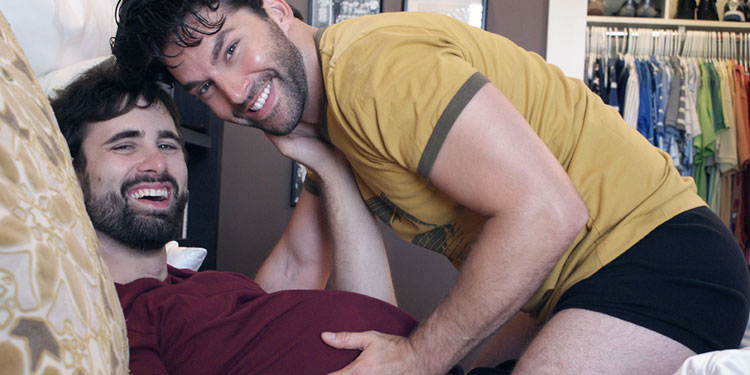
Director: Matt Riddlehoover
Running Time: 90 mins
Certificate: NR

Director Matt Riddlehoover has been described as gay cinema’s answer to Woody Allen. It’s difficult to know whether he’s consciously thinking about that when he makes his movies, but there are definitely a lot of echoes of Woody in his work.
With Paternity Leave those echoes are particularly of some of Allen’s earlier work, where he took an absurdist situation but then didn’t treat it in an overtly over the top, silly way. The movie follows boyfriends Greg (Jacob York) and Ken (Charlie David), who’ve been together for four years, but whose lives are flipped upside-down when Greg discovers that he’s pregnant.
It turns out that for unknown reasons all sorts of men have suddenly got a bun in the oven, and Greg has gotten caught up in that. It’s a big adjustment for both guy, as while they have talked about adopting Ken has always thought that was something for the future and isn’t sure how to deal with a child being on the way – unless this is some sort of sign. Greg meanwhile is understandably initially freaked out, but he begins to come to terms with his situation, particularly with the help of his doula/midwife Thomas (Chris Salvatore).
The pregnancy ends up raising a whole hosts of hidden problems in Greg and Ken’s relationship, such as their commitment to each other and what their future should be, which threatens to split them up forever.
At the beginning Paternity Leave takes a little getting used to. The set-up of a man getting pregnant is bound to immediately make you assume this is going to be a broad, silly comedy, but it isn’t. It is a rom-com, but it’s far from broad slapstick and tends to treat its central premise fairly seriously. Plenty of humour emerge from it, but it’s keen not to go too far over the top. As with Woody’s more absurdist works, it presents an incongruous situation in an oddly realistic, grounded way, and then uses it to explore ideas that are only partially directly related to that situation.
Indeed, in some respects that’s a bit of a weakness with Paternity Leave, as the issues it’s most interested in – to do with relationships, commitment and trying to find meaning in that – have been dealt with plenty of times before and the male pregnancy doesn’t add an awful lot to it. Even in the aspects where it could help – such as whether not having children helps some men feel like they’re keeping their options open rather than fully committing to what they’ve got – it doesn’t really delve much deeper than other films have. In fact despite the pregnancy it’s themes are oddly clichéd, with the main exception being its occasional interest in whether a patriarchal society would be rather different it men got pregnant.
It does find some interesting things to do with the premise though, such as Ken’s disappointment when another man gives birth and it turns out they aren’t the first. There are moments when Paternity Leave relies a little too heavily on trying to bring out the undercurrents of the situation by having two men having a conversation that wouldn’t seem particularly unusual between a man and a pregnant woman. Sometimes that works extremely well and makes you think about it in a different way, but at other points it’s a little strained.
The cast is great though, particularly Jacob York as the pregnant Greg, who has the ability to simultaneously take things in his stride and freak out. Gay movie stalwart Charlie David provides great support, while Eating Out’s Chris Salvatore is also good as doula Thomas, who offers much needed support when things go bad for Ken and Greg.
While there are a few issues with the film, largely it’s successful, entertaining and sometimes pretty funny. Indeed, of Matt Riddlehoover’s movies it’s probably the most easily enjoyable, feeling less self-conscious than some of his earlier works. There is the vague feeling that it could have made more of its premise, but overall by taking an unexpectedly grounded approach to its ‘absurd’ premise it works well, creating a film that looks at some fairly standard rom-com ideas in a slightly different way. That difference may not have been as much as the movie had hoped, but it’s still fun.
Overall Verdict: While taking a relatively grounded approach to a pregnant man may seem a little odd, it works surprisingly well. Paternity Leave’s themes are ultimately pretty standard rom-com ones that we’ve seen many times before, but it’s still an entertaining ride that’s often very funny.
Paternity Leave is currently screening at festivals
Reviewer: Tim Isaac





Leave a Reply (if comment does not appear immediately, it may have been held for moderation)